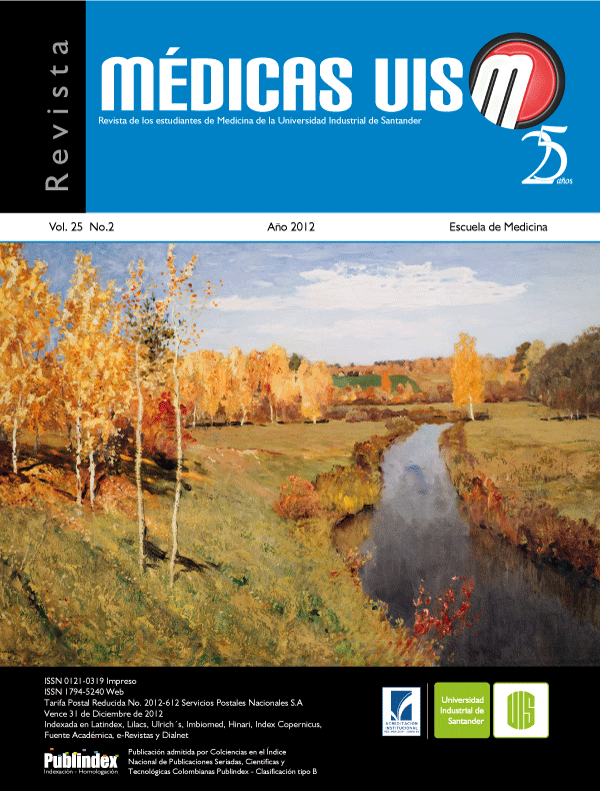Resumen
Los pacientes ancianos representan un porcentaje significativo de la población que padece enfermedades oncológicas, llevando a un desafío en la toma de decisiones. Esto debido a que las escalas de valoración funcional que tradicionalmente se emplean en oncología como el índice de Karnofsky o el estado funcional del Eastern Cooperative Oncology Group dejan de lado condiciones como la fragilidad, el deterioro cognitivo, la depresión y la dependencia en actividades de la vida diaria que predicen una menor tolerancia al tratamiento médico y están asociadas con mayor mortalidad. El objetivo del presente estudio fue evaluar la importancia de la valoración geriátrica integral en estos pacientes, en el sentido que permite el diseño de planes integrales de cuidado y rehabilitación, obligando a la vinculación de los geriatras en los equipos multidisciplinarios que manejan patología tumoral. Existen instrumentos como el Vulnerable Elders Survey 13 con suficiente sensibilidad que permiten en corto tiempo poder identificar aquellos ancianos que se beneficiarán de una valoración más amplia para decidir su mejor tratamiento. (MÉD.UIS. 2012;25(2):121-8)
Referencias
2. Murthy VH, Krumholz HM, Gross CP. Participation in cancer clinical trials: Race-, sex-, and age-based disparities. JAMA. 2004;291:2720-6.
3. Extermann M, Hurria A. Comprehensive Geriatric Assessment for Older Patients with Cancer. J Clin Oncol. 2007;25:1824-31.
4. Extermann M. Studies of Comprehensive Geriatric Assessment in Patients with Cancer. Cancer Control .2003;10(6):463-8.
5. Inouye SK, Pedizzi PN, Robison JT, et al. Importance of functional measures in predicting mortality among older hospitalized patients. JAMA. 1998;279:1187-93.
6. Terret C, Zuliam G, Naiem A, Albrand G. Multidisciplinary Approach to the Geriatric Oncology Patient. J Clin Oncol. 2007;25:1876-81.
7. Rubenstein LZ, Rubenstein LV. Multidimensional Geriatric Assessment. In: Howard M, Rockwood K, Woodhouse K. Brocklehurst’s Textbook of Geriatric Medicine and Gerontology. Saunders Elsevier ed. Philadelphia. 7th ed. 2010. pp. 211-7.
8. Wieland D, Hirth V. Comprehensive Geriatric Assessment. Cancer Control 2003;10(6):454-62
9. Rodin M, Mohile S. A Practical Approach to Geriatric Assessment in Oncology. J Clin Oncol. 2007;25:1936-44.
10. Monfardini S, Gridelli C, Pasetto L, Soubeyran P, Droz JP, Basso U. Vulnerable and frail elderly: An approach to the management of the main tumour types. Eur J of Cancer. 2008;44:488-93.
11. Mohile SG, Bylow K, Dale W, et al. A pilot study of the Vulnerable Elders Survey-13 compared with the comprehensive geriatric assessment for identifying disability in older patients with prostate cancer who receive androgen ablation. Cancer. 2007;109:802-10.11. Luciani A, Ascione G, Bertuzzi C, et al. Detecting Disabilities in Older Patients With Cancer: Comparison Between Comprehensive Geriatric Assessment and Vulnerable Elders Survey-13. J Clin Oncol. 2010;28:2046-50.
12. Monfardini S, Basso U, Fiduccia P, Brunello A, Baretta Z, Soldà C, et al. Can the short screening test Vulnerable Elders Survey 13 (VES-13) substitute for the time-consuming comprehensive geriatric assessment (CGA) to identify vulnerable/frail elderly breast cancer patients? J Clin Oncol. 2010. (suppl;9114)28:15s.
13. Saliba D, Elliott M, Rubenstein LZ, et al. The Vulnerable Elders Survey: A tool for identifying vulnerable older people in the community. J Am Geriatr Soc. 2001;49:1691-9.
14. Rockwood K, Mitnitski A. Frailty Defined by Deficit Accumulation and Geriatric Medicine Defined by Frailty. Clin Geriatr Med. 2011;27: 17–26.
15. Balducci L. New Paradigms for Treating Elderly Patients With Cancer: The Comprehensive Geriatric Assessment and Guidelines for Supportive Care. J Support Oncol. 2003;1:30–37.
16. Fried LP, Tangen CM, Walston J, et al. Frailty in older adults: evidence for a phenotype. J Gerontol A Biol Sci Med Sci. 2001;56:M146–M156.
17. Ensrud K, Ewing S, Cawthon P y cols. A Comparison of Frailty Indexes for the Prediction of Falls, Disability, Fractures and Mortality in Older Men. J Am Geriatr Soc. 2009;57(3): 492–8.
18. Kumar S, Katheria V, Hurria A. Evaluating the Older Patient with Cancer: Understanding Frailty and the Geriatric Assessment. Cancer J Clin. 2010; 60:120-2.
19. Repetto L, Fratino L, Audisio R y et al. Comprehensive Geriatric Assessment Adds Information to Eastern Cooperative Oncology Group Performance Status in Elderly Cancer Patients: An Italian Group for Geriatric Oncology Study. J Clin Oncol. 2002;20(2):494-502.
20. Soejono C. The role of comprehensive geriatric assessment (CGA) in the management of stage 3 hepatocellular carcinoma in the elderly. Crit Rev Oncol Hematol. 2006; 60:S20
21. Freyer G, Geay JF, Touzet S, et al. Comprehensive geriatric assessment predicts tolerance to chemotherapy and survival in elderly patients with advanced ovarian carcinoma: a GINECO study. Annals of Oncology 2005; 16:1795–800.
22. Clough-Glorr K, Stuck A, Thwin S y Silliman R. Older Breast Cancer Survivors: Geriatric Assessment Domains Are Associated With Poor Tolerance of Treatment Adverse Effects
